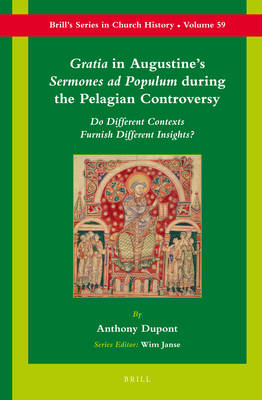
- Afhalen na 1 uur in een winkel met voorraad
- Gratis thuislevering in België vanaf € 30
- Ruim aanbod met 7 miljoen producten
- Afhalen na 1 uur in een winkel met voorraad
- Gratis thuislevering in België vanaf € 30
- Ruim aanbod met 7 miljoen producten
Zoeken
Gratia in Augustine's Sermones AD Populum During the Pelagian Controversy
Do Different Contexts Furnish Different Insights?
Anthony DuPont
€ 453,45
+ 906 punten
Omschrijving
During the last decades, the doctrine of grace of Augustine of Hippo (354-430) has been studied in depth. The occurrence of grace in Augustine's ca. 580 sermones ad populum has not yet been systematically analysed. This monograph studies the presence of grace in sermones preached during the period of the Pelagian controversy - a debate precisely on the relation between divine grace and human freedom. Does Augustine deal with grace differently in these sermones and his anti-pelagian tractates? First, the gratia content of the sermones does not differ from that of the systematic treatises. Second, the treatment of this topic differs on occasion, a difference determined by the biblical, liturgical, rhetorical and contextual framework of the sermones. This book explores the anthropological-ethical perspective of grace in Augustine, which results in a correction of the image of an Augustine overemphasising God and neglecting man, and in a plea to see continuity in his thinking on grace.
Specificaties
Betrokkenen
- Auteur(s):
- Uitgeverij:
Inhoud
- Aantal bladzijden:
- 696
- Taal:
- Engels
- Reeks:
- Reeksnummer:
- nr. 59
Eigenschappen
- Productcode (EAN):
- 9789004231573
- Verschijningsdatum:
- 12/10/2012
- Uitvoering:
- Hardcover
- Formaat:
- Genaaid
- Afmetingen:
- 155 mm x 241 mm
- Gewicht:
- 1111 g

Alleen bij Standaard Boekhandel
+ 906 punten op je klantenkaart van Standaard Boekhandel
Beoordelingen
We publiceren alleen reviews die voldoen aan de voorwaarden voor reviews. Bekijk onze voorwaarden voor reviews.








